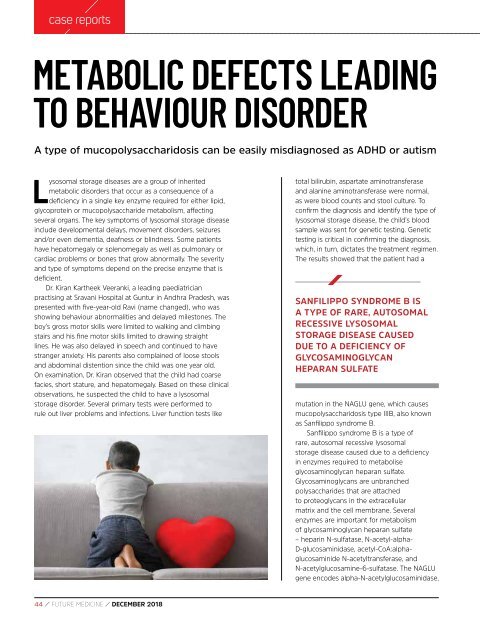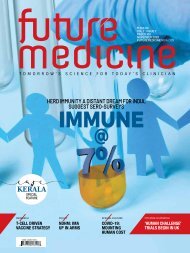FM DECEMBER 2018 ISSUE - digital edition
Create successful ePaper yourself
Turn your PDF publications into a flip-book with our unique Google optimized e-Paper software.
case reports<br />
METABOLIC DEFECTS LEADING<br />
TO BEHAVIOUR DISORDER<br />
A type of mucopolysaccharidosis can be easily misdiagnosed as ADHD or autism<br />
Lysosomal storage diseases are a group of inherited<br />
metabolic disorders that occur as a consequence of a<br />
deficiency in a single key enzyme required for either lipid,<br />
glycoprotein or mucopolysaccharide metabolism, affecting<br />
several organs. The key symptoms of lysosomal storage disease<br />
include developmental delays, movement disorders, seizures<br />
and/or even dementia, deafness or blindness. Some patients<br />
have hepatomegaly or splenomegaly as well as pulmonary or<br />
cardiac problems or bones that grow abnormally. The severity<br />
and type of symptoms depend on the precise enzyme that is<br />
deficient.<br />
Dr. Kiran Kartheek Veeranki, a leading paediatrician<br />
practising at Sravani Hospital at Guntur in Andhra Pradesh, was<br />
presented with five-year-old Ravi (name changed), who was<br />
showing behaviour abnormalities and delayed milestones. The<br />
boy’s gross motor skills were limited to walking and climbing<br />
stairs and his fine motor skills limited to drawing straight<br />
lines. He was also delayed in speech and continued to have<br />
stranger anxiety. His parents also complained of loose stools<br />
and abdominal distention since the child was one year old.<br />
On examination, Dr. Kiran observed that the child had coarse<br />
facies, short stature, and hepatomegaly. Based on these clinical<br />
observations, he suspected the child to have a lysosomal<br />
storage disorder. Several primary tests were performed to<br />
rule out liver problems and infections. Liver function tests like<br />
total bilirubin, aspartate aminotransferase<br />
and alanine aminotransferase were normal,<br />
as were blood counts and stool culture. To<br />
confirm the diagnosis and identify the type of<br />
lysosomal storage disease, the child’s blood<br />
sample was sent for genetic testing. Genetic<br />
testing is critical in confirming the diagnosis,<br />
which, in turn, dictates the treatment regimen.<br />
The results showed that the patient had a<br />
SANFILIPPO SYNDROME B IS<br />
A TYPE OF RARE, AUTOSOMAL<br />
RECESSIVE LYSOSOMAL<br />
STORAGE DISEASE CAUSED<br />
DUE TO A DEFICIENCY OF<br />
GLYCOSAMINOGLYCAN<br />
HEPARAN SULFATE<br />
mutation in the NAGLU gene, which causes<br />
mucopolysaccharidosis type IIIB, also known<br />
as Sanfilippo syndrome B.<br />
Sanfilippo syndrome B is a type of<br />
rare, autosomal recessive lysosomal<br />
storage disease caused due to a deficiency<br />
in enzymes required to metabolise<br />
glycosaminoglycan heparan sulfate.<br />
Glycosaminoglycans are unbranched<br />
polysaccharides that are attached<br />
to proteoglycans in the extracellular<br />
matrix and the cell membrane. Several<br />
enzymes are important for metabolism<br />
of glycosaminoglycan heparan sulfate<br />
– heparin N-sulfatase, N-acetyl-alpha-<br />
D-glucosaminidase, acetyl-CoA:alphaglucosaminide<br />
N-acetyltransferase, and<br />
N-acetylglucosamine-6-sulfatase. The NAGLU<br />
gene encodes alpha-N-acetylglucosaminidase,<br />
44 / FUTURE MEDICINE / <strong>DECEMBER</strong> <strong>2018</strong>


















